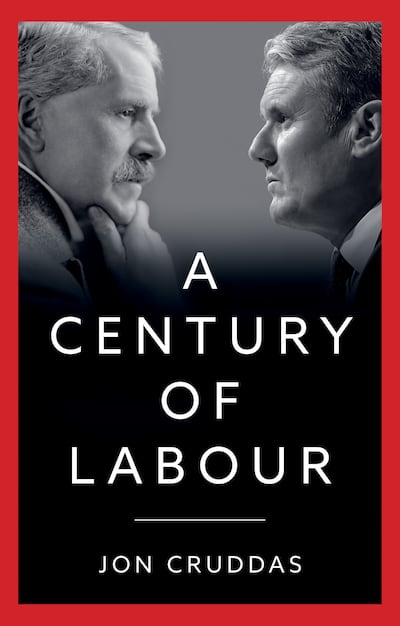At a time when Labour is soaring in the polls and widely seen as a near-certainty to form the next British government, the man at the heart of the party’s thinking has spoken of the “huge opportunity” that awaits Keir Starmer.
Jon Cruddas has come to appreciate his boss's political agility in a fractious party, describing his decisions as "quite cute".
That dexterity will come under severe examination from day one if as expected the Labour leader enters Downing Street later this year.
Once Labour’s chief policy thinker, Mr Cruddas has been critical of the Labour leader, but in an interview with The National it became clear his views have mellowed on Britain’s likely next prime minister.
Labour’s century
Entering Downing Street would in itself would be a remarkable achievement. Only three Labour leaders have won general elections outright in the party’s history, and it has been in power for only 33 of the past 100 years.
Those figures come easily to Mr Cruddas, whose book A Century of Labour is published on Friday to mark the centenary of the first time the party took office, under Ramsay MacDonald on 22 Jan 1924.

It’s an “incredible history of significant achievements but also of epic failures” said Mr Cruddas, reeling off the achievements with ease and relish as we chatted in a quiet corner of parliament, close to the heart of the power that has eluded Labour for 14 years.
The National Health Service, welfare state, national minimum wage, Bank of England independence, devolution and Northern Ireland’s Good Friday Agreement, are landmark successes.
And the failures? Being out of power for long stretches, all lasting more than a decade, and others such as supporting the invasion of Iraq.
Glitz free
While Mr Starmer lacks former prime minister Tony Blair’s “glitz”, he too will almost certainly be faced with foreign policy crises from the moment he enters Downing Street, possibly this autumn.
As a former director of public prosecutions his abilities will help him absorb the detail and his “pragmatism” will ensure necessary but potentially unpopular decisions are made, said Mr Cruddas.

That latter quality has seen Mr Starmer support the government on its line of calling for a “sustainable ceasefire” in the Israel-Gaza war and the Houthi air strikes.
“His temperament is not performative, it's pragmatic and focused on the resolution of issues and that could work quite well as prime minister,” said Mr Cruddas, 61. “It’s going to be a difficult inheritance and a pragmatic approach could be what's needed to deal with a potential Donald Trump presidency.”
There is also a desire to build bridges with the international community, evidenced by sending his shadow chancellor Rachel Reeves to mix with world leaders and company chiefs in Davos this week. Mr Starmer was also notably present at Cop28 in UAE last year.
On the cusp
Labour’s road to power is narrow, Mr Cruddas states, markedly more difficult for the party than the Conservatives, mainly due to a hostile press and the voting system.
Power only comes when the party manages to unite its various factions, which swing between the right of centre to the far left, said the centre-left MP, who served as policy chief under former leader Ed Miliband.
What Mr Starmer seems to have achieved is an adroitness in not overtly belonging to any particular faction or their policies.
Therefore, Mr Cruddas carefully admits that Labour could be “on the cusp” of the sixth majority government in its history.
That comes on the back of the latest poll, which put the Tories 27 points behind Labour. “It could be a serious, significant majority,” said the MP. “But I’m not assuming anything because there's quite a few laps of the track left.”
If Labour does win big – some polls suggest they could do so by 100 MPs – then that “creates huge opportunities”.
But a Starmer administration will not be a government “awash with grand theories of change”. Instead he will “dial it down a bit” Mr Cruddas suggested, which he said was what people needed after the Tory ructions of the post-Brexit years.
“I don't think you'll see a lot of showbiz,” he added.
Good healer
Mr Starmer will be more like Harold Wilson – twice Prime Minister in the 1960s and 1970s – with his solid industrial strategy, rather than the glitz of Mr Blair. He also predicts a “a good healer who brings people together”.
The Tories may need more of a miracle worker than healer if they are to avoid implosion after their looming defeat.
The Labour thinker articulates the concern of many moderate Conservatives, who fear the party could spilt once out of power, with the right-wingers heading into the arms of Nigel Farage.
“I don't want to be melodramatic but it does looks like Nigel Farage is circling,” he said.
“I've been in Labour when it's been really tough and you can see how parties crack open.”
The Tories had been “ripped apart” by the post-Brexit tensions, something evident on Thursday when Prime Minister Rishi Sunak attempted to shore up party unity following rebellions on his Rwanda deportation policy.
At a Downing Street press conference Mr Sunak failed to say whether he would punish the rebels or guarantee that the illegal immigrants would be put on flights to Rwanda this year.

Elusive leader
Those ructions are something Mr Starmer will largely avoid having moulded a relatively united party after the pivot to the far left under the previous leader, Jeremy Corbyn.
Mr Starmer, “has come in relatively light”, from no particular Labour tradition, which allows him to be “agile”, said the MP, who will leave parliament at the next election after representing Dagenham in Essex for 23 years.
“But he can be quite elusive in terms of nailing down that political character and definition,” warned Mr Cruddas.
As a pragmatist – and a witness to Tory division – Mr Starmer is likely highly conscious of the pitfalls that come with power.


















































